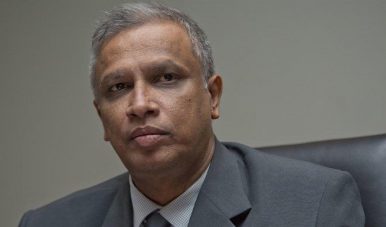M.A. Sumanthiran is a Sri Lankan lawyer, parliamentarian and member of the Illankai Tamil Arasu Kachchi (ITAK), a Tamil political party. The Diplomat‘s Taylor Dibbert spoke with Sumanthiran about Sri Lankan politics, Tamil affairs, and India-Sri Lanka ties.
By Taylor Dibbert.
The Diplomat: Sustained militarization and land issues pose significant challenges for civilians residing in Sri Lanka’s Northern and Eastern Provinces. How much progress has been made in these areas since Maithripala Sirisena assumed the presidency in January 2015?
M.A. Sumanthiran: Not much. There was significant movement initially, with about 400 acres being released in Palaly [in the North] immediately and the whole of Sampur in the East. Thereafter it has come in fits and starts. Altogether around 2,000 acres have been released in Palaly with another 4,000-odd acres still under military occupation. In the Vanni [the mainland part of the Northern Province], several thousand acres still remain exclusively in military hands.
The Tamil National Alliance (TNA) is the country’s principal Tamil political grouping. How would you describe the relationship(s) between the various constituent members?
We are a very loose alliance. I say that because, strictly speaking, only one political party that signed the original [Memorandum of Understanding] MOU setting up the TNA still remains in the TNA, and that is [the Tamil Eelam Liberation Organization] TELO.
[The All Ceylon Tamil Congress] ACTC moved out in 2010; [the Tamil United Liberation Front] TULF went out in 2003, came back in 2011 and went out again in 2013. [The Eelam People’s Revolutionary Liberation Front] EPRLF came in a little after TNA was formed, and is still a constituent. ITAK became part of it around 2003/4 and [the People’s Liberation Organization of Tamil Eelam] PLOTE came in 2011. So presently there are 4 parties: ITAK, TELO, EPRLF and PLOTE. The original MOU may not be valid since none of these except TELO is a signatory to it!
What are your thoughts on the Tamil People’s Council? What sort of role do you see this entity playing in the coming years?
The TPC was formed secretively by those who were routed at the general elections in 2015. Even the Chief Minister of the Northern Province [C.V. Wigneswaran] did not support his own party at the elections, but the TNA swept the polls.
ITAK, which is the dominant party in the TNA, was kept in the dark with regard to the formation of the TPC and we knew about it only after its first meeting. Such a start can hardly inspire any kind of confidence as to their bona fides or integrity. I cannot see them playing any constructive role in the long-term.
The 34th session of the UN Human Rights Council is ongoing and another country-specific resolution is expected to be passed on Sri Lanka. How has the session been going? Will you be satisfied with the outcome?
The resolution that will be passed is to our [TNA’s] satisfaction, since it does not dilute [UN Human Rights Council] HRC 30/1 which was passed on October 1, 2015. Sri Lanka has not completely implemented even one of its obligations under 30/1. In fact, some of those have not even been touched yet. In this scenario, our first task was to ensure that Sri Lanka re-commits itself to those obligations. Second, the international monitoring mechanism should be extended for a further period. I think both those objectives are met with the consensus resolution being adopted now. That is not to say that we are satisfied with the progress made by Sri Lanka – far from it. But, knowing the available tools at our disposal at this time, I think we have made progress.
In terms of the transitional justice agenda. What actions would you like to see the Sirisena administration take over the next few months?
They need to pass laws that criminalize certain acts with retrospective effect. They have started with enforced disappearances; the bill has now been gazetted. All relevant international crimes need to be made criminal in the municipal laws of Sri Lanka. In parallel, they need to operationalize the Office of the Missing Persons.
How have India-Sri Lanka relations evolved since January 2015?
I would say it was at an all-time high just after January 2015, but has not been that good thereafter. This is due to the transactions Sri Lanka is having with China lately.
Devolution is supposed to be a key part of Sri Lanka’s constitution-building project. Is there space for New Delhi to play a prominent role in these negotiations?
Most certainly. New Delhi will eventually play the most important role in this. The Indo-Lanka Accord is still a valid bilateral international agreement, which India will insist on implementing fully.
What are your thoughts on the ongoing disputes between Indian and Sri Lankan fishermen? Is this a problem that could be resolved in the near-term? If so, how?
Once bottom-trawling is banned by both countries and enforced effectively, 90 percent of the issues will be solved. Both countries have agreed that this practice must stop. That agreement was reached in November last year. After that it will be the age-old “straying” across the [International Maritime Boundary] IMB, which cannot be avoided with such a narrow straight of water.
This interview has been edited for clarity.
